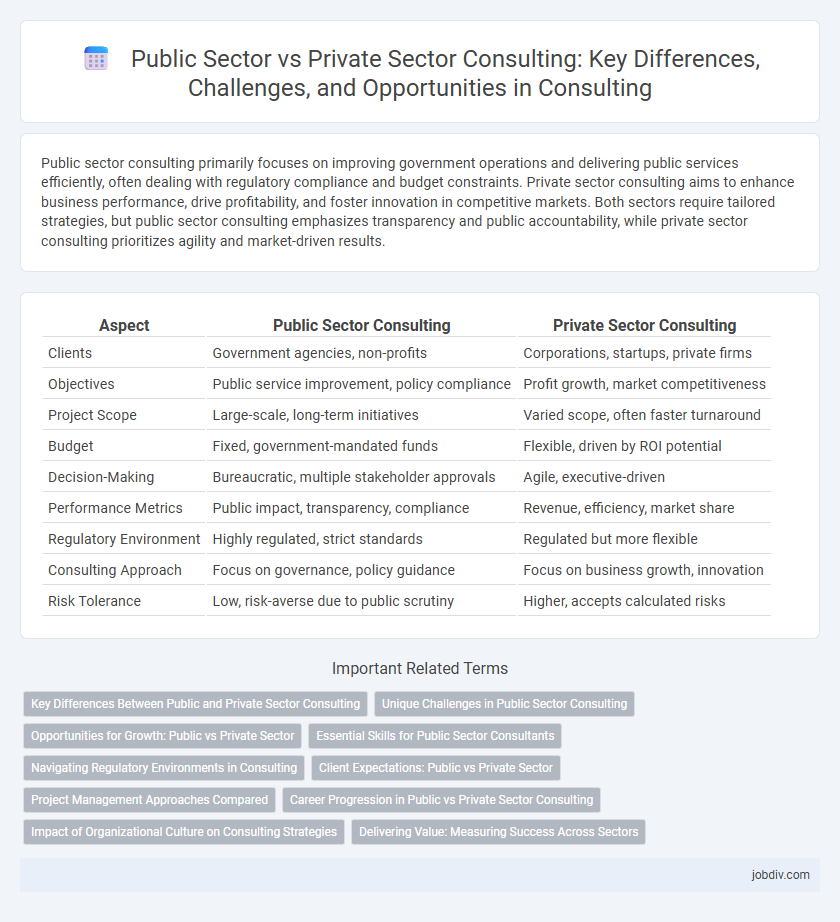Public sector consulting primarily focuses on improving government operations and delivering public services efficiently, often dealing with regulatory compliance and budget constraints. Private sector consulting aims to enhance business performance, drive profitability, and foster innovation in competitive markets. Both sectors require tailored strategies, but public sector consulting emphasizes transparency and public accountability, while private sector consulting prioritizes agility and market-driven results.
Table of Comparison
| Aspect | Public Sector Consulting | Private Sector Consulting |
|---|---|---|
| Clients | Government agencies, non-profits | Corporations, startups, private firms |
| Objectives | Public service improvement, policy compliance | Profit growth, market competitiveness |
| Project Scope | Large-scale, long-term initiatives | Varied scope, often faster turnaround |
| Budget | Fixed, government-mandated funds | Flexible, driven by ROI potential |
| Decision-Making | Bureaucratic, multiple stakeholder approvals | Agile, executive-driven |
| Performance Metrics | Public impact, transparency, compliance | Revenue, efficiency, market share |
| Regulatory Environment | Highly regulated, strict standards | Regulated but more flexible |
| Consulting Approach | Focus on governance, policy guidance | Focus on business growth, innovation |
| Risk Tolerance | Low, risk-averse due to public scrutiny | Higher, accepts calculated risks |
Key Differences Between Public and Private Sector Consulting
Public sector consulting primarily addresses government regulations, public policies, and social impact, requiring expertise in navigating bureaucratic processes and compliance standards, whereas private sector consulting focuses on profit maximization, competitive strategy, and operational efficiency within corporate environments. Key differences include stakeholders' objectives, with public sector prioritizing public value and transparency, while private sector emphasizes shareholder returns and market growth. Project scopes in public consulting often involve large-scale infrastructure, policy development, or public services, contrasting with the private sector's focus on business transformation, innovation, and revenue optimization.
Unique Challenges in Public Sector Consulting
Public sector consulting faces unique challenges such as navigating complex regulatory frameworks, managing public accountability, and addressing the diverse needs of multiple stakeholders. Consultants must ensure compliance with government policies while delivering cost-effective solutions amid budget constraints and political pressures. Unlike private sector consulting, public sector projects often require heightened transparency and adherence to strict procurement procedures.
Opportunities for Growth: Public vs Private Sector
Public sector consulting offers opportunities for growth through large-scale projects funded by government budgets, emphasizing policy implementation and social impact, which demand specialized regulatory knowledge and long-term strategic planning. Private sector consulting provides rapid growth potential driven by competitive market dynamics, innovation, and profit maximization, requiring expertise in business transformation, operational efficiency, and customer experience. Both sectors present distinct growth pathways, with public sector consulting focused on stability and social value, while private sector consulting prioritizes agility and financial performance.
Essential Skills for Public Sector Consultants
Public sector consultants require a deep understanding of government regulations, policy analysis, and public administration to navigate complex bureaucratic environments effectively. Strong stakeholder engagement skills and expertise in transparency and accountability frameworks are essential to drive successful outcomes in public projects. Proficiency in data-driven decision-making and navigating political landscapes distinguishes public sector consultants from their private sector counterparts.
Navigating Regulatory Environments in Consulting
Public sector consulting requires deep expertise in navigating complex regulatory frameworks, government policies, and compliance standards unique to public institutions. Private sector consulting demands agility in adapting to industry-specific regulations, corporate governance, and competitive market dynamics to drive business growth. Mastery of sector-specific regulations and stakeholder engagement is critical for successful strategy implementation in both consulting domains.
Client Expectations: Public vs Private Sector
Client expectations in public sector consulting prioritize transparency, regulatory compliance, and alignment with public policy objectives to ensure accountability and societal impact. In contrast, private sector consulting clients focus on agility, profit maximization, and competitive advantage, demanding customized solutions that drive operational efficiency and rapid market responsiveness. Understanding these distinct priorities is essential for tailoring strategies that meet sector-specific performance metrics and stakeholder demands.
Project Management Approaches Compared
Public sector consulting project management emphasizes regulatory compliance, stakeholder engagement, and transparent budgeting due to government oversight, resulting in longer approval cycles and risk-averse planning. Private sector consulting adopts agile methodologies, prioritizes rapid delivery, cost efficiency, and competitive advantage, enabling more flexible and iterative project execution. Differences in project scope, decision-making speed, and accountability frameworks significantly influence strategy and resource allocation in both sectors.
Career Progression in Public vs Private Sector Consulting
Career progression in public sector consulting often involves navigating structured hierarchies with clear promotion pathways influenced by government policies and budget cycles, offering stability and opportunities to impact public policies. In contrast, private sector consulting typically provides faster advancement through merit-based performance metrics, exposure to diverse industries, and higher earning potential, driven by market demands and client acquisition success. Professionals in private consulting may experience more competitive environments and varied project scopes, while public sector consultants benefit from long-term, mission-driven roles with potential for specialization in regulatory or socio-economic domains.
Impact of Organizational Culture on Consulting Strategies
Public sector consulting often requires strategies that align with bureaucratic decision-making processes and emphasize compliance with regulatory frameworks, reflecting the conservative and risk-averse organizational culture typical of government agencies. In contrast, private sector consulting strategies prioritize agility, innovation, and competitive advantage, adapting to dynamic corporate cultures driven by profit motives and market responsiveness. Understanding these cultural distinctions is critical for consultants to deliver tailored solutions that effectively address sector-specific challenges and stakeholder expectations.
Delivering Value: Measuring Success Across Sectors
Public sector consulting prioritizes delivering value through improving public services and ensuring transparency, with success measured by social impact, policy effectiveness, and stakeholder satisfaction. Private sector consulting focuses on driving profitability, market growth, and operational efficiency, using financial metrics and return on investment as key performance indicators. Both sectors require tailored strategies for measurable outcomes, emphasizing value creation aligned with their distinct organizational goals.
Public Sector Consulting vs Private Sector Consulting Infographic

 jobdiv.com
jobdiv.com